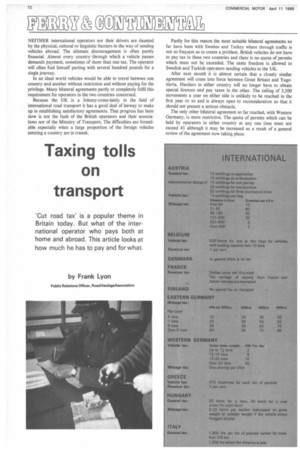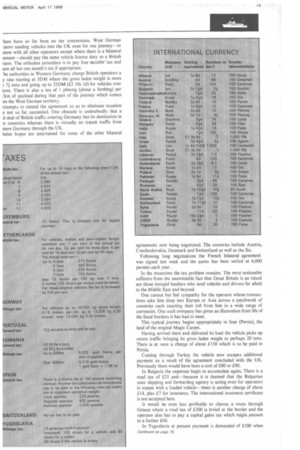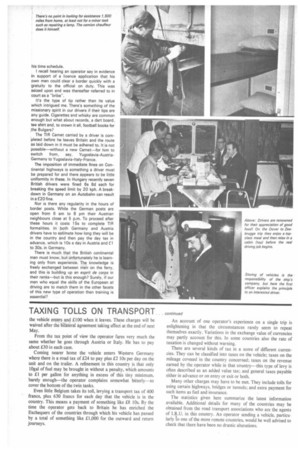Taxing tolls on transport
Page 74

Page 75

Page 78

If you've noticed an error in this article please click here to report it so we can fix it.
'Cut road taxi is a popular theme in Britain today. But what of the international operator who pays both at home and abroad. This article looks at how much he has to pay and for what.
NEITHER international operators nor their drivers are daunted by the physical, cultural or linguistic barriers in the way of sending vehicles abroad. The ultimate discouragement is often purely financial. Almost every country through which a vehicle passes demands payment, sometimes of more than one tax. The operator will often find himself parting with several hundred pounds for a single journey.
In an ideal world vehicles would be able to travel between one country and another without restriction and without paying for the privilege. Many bilateral agreements partly or completely fulfil this requirement for operators in the two countries concerned.
Because the UK is a Johnny-come-lately in the field of international road transport it has a good deal of leeway to make up in establishing satisfactory agreements. That progress has been slow is not the fault of the British operators and their associations nor of the Ministry of Transport. The difficulties are formidable especially when a large proportion of the foreign vehicles entering a country are in transit. Partly for this reason the most suitable bilateral agreements so far have been with Sweden and Turkey where through traffic is not so frequent as to create a problem. British vehicles do not have to pay tax in these two countries and there is no quota of permits which must not be exceeded. The same freedom is allowed to Swedish and Turkish operators sending vehicles to the UK.
After next month it is almost certain that a closely similar agreement will come into force between Great Britain and YugoSlavia. Hauliers in either country will no longer have to obtain special licences and pay taxes in the other. The ceiling of 2,500 movements a year on either side is unlikely to be reached in the first year or so and is always open to reconsideration so that it should not present a serious obstacle.
The only other bilateral agreement so far reached, with Western Germany, is more restrictive. The quota of permits which can be held by operators in either country at any one time must not exceed 43 although it may be increased as a result of a general review of the agreement now taking place.
'here have so far been no tax concessions. West German -ators sending vehicles into the UK even for one journey—in imon with all other operators except where there is a bilateral lement—should pay the same vehicle licence duty as a British rator. The orthodox procedure is to pay four months' tax and aim all but one month's tax if appropriate.
'he authorities in Western Germany charge British operators a y rate starting at 3DM where the gross laden weight is more 7tons and going up to 25DM (£2 lOs 1d) for vehicles over tons. There is also a tax of 1 pfennig (about a farthing) per /km of payload during that part of the journey which comes lin the West German territory.
kttempts to extend the agreement so as to eliminate taxation e not so far_ succeeded. One obstacle is undoubtedly that a d deal of British traffic entering Germany has its destination in
countries whereas there is virtually no transit traffic from stern Germany through the UK.
letter hopes are entertained for some of the other bilateral agreements now being negotiated. The countries include Austria, Czechoslovakia, Denmark and Switzerland as well as the Six.
Following long negotiations the French bilateral agreement was signed last week and the quota has been settled at 6,000 permits each year.
In the meantime the tax problem remains. The most noticeable sufferers from the unavoidable fact that Great Britain is an island are those intrepid hauliers who send vehicles and drivers far afield to the Middle East and beyond.
One cannot but feel sympathy for the operator whose transactions take him deep into Europe or Asia across a patchwork of countries each exacting their toll from him in a wide range of currencies. One such company has given an illustration from life of the fiscal burdens it has had to meet.
This typical journey begins appropriately in Iran (Persia), the land of the original Magic Carpet.
Having arrived there and delivered its load the vehicle picks up return traffic bringing its gross laden weight to perhaps 20 tons. There is at once a charge of about £150 which is to be paid in Persia.
Coming through Turkey the vehicle now escapes additional payment as a result of the agreement concluded with the UK. Previously there would have been a cost of £80 or £90.
In Bulgaria the expenses begin to accumulate again. There is a road tax of £35 and—because it is deemed that the Bulgarian state shipping and forwarding agency is acting even for operators in transit with a loaded vehicle—there is another charge of about £14, plus £7 for insurance. The international insurance certificate is not accepted here.
It would be even less profitable to choose a route through Greece where a road tax of £300 is levied at the border and the operator also has to pay a capital gains tax which might amount to a further £60.
In Yugoslavia at present payment is demanded of £100 when the vehicle enters and £100 when it leaves. These charges will be waived after the bilateral agreement taking effect at the end of next May.
From the tax point of view the operator fares very much the same whether he goes through Austria or Italy. He has to pay about £30 in each case.
Coming nearer home the vehicle enters Western Germany where there is a road tax of £24 to pay plus £2 lOs per day on the unit and on the trailer. A refinement in this country is that only lOgal of fuel may be brought in without a penalty, which amounts to £1 per gallon for anything in excess of this tiny minimum, barely enough—the operator complains somewhat bitterly—to cover the bottom of the twin tanks.
Even little Belgium takes its toll, levying a transport tax of 400 francs, plus 630 francs for each day that the vehicle is in the country. This means a payment of something like £8 10s. By the time the operator gets back to Britain he has enriched the Exchequers of the countries through which his vehicle has passed by a total of something like £1,000 for the outward and return journeys. An account of one operator's experience on a single trip is enlightening in that the circumstances rarely seem to repeat themselves exactly. Variations in the exchange value of currencies may partly account for this. In some countries also the rate of taxation is changed without warning.
There are several kinds of tax in a score of different currencies. They can be classified into taxes on the vehicle; taxes on the mileage covered in the country concerned; taxes on the revenue earned by the operator while in that country—this type of levy is often described as an added value tax; and general taxes payable either in advance or on entry or exit or both.
Many other charges may have to be met. They include tolls for using certain highways, bridges or tunnels; and extra payment for such items as fuel and insurance.
The statistics given here summarize the latest information available. Additional details for many of the countries may be obtained from the road transport associations who are the agents
of in this country. An operator sending a vehicle, particularly lo one of the more remote countries, would be well advised to check that there have been no drastic alterations.












































































































































